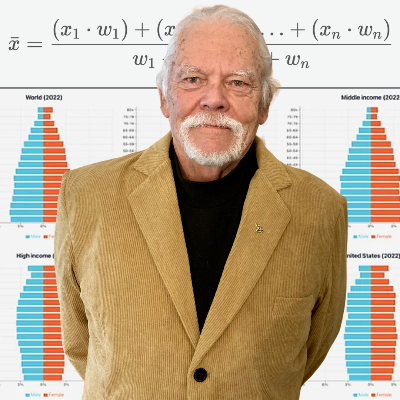
Department of Sociology and Anthropology, National University of Singapore, Singapore, SingaporeAging and health; Population studies; Economic sociology
Feng Qiushi received his doctoral degree from Duke University and is an Associate Professor in the Department of Sociology and Anthropology at the National University of Singapore (NUS). He is also the Deputy Head of the department, Assistant Dean of the Research Division of the Faculty of Arts and Social Sciences (FASS) at NUS, and vice president of the Population Association of Singapore (PAS).
His research fields are aging and health, population studies, and development studies. He has published extensively in these fields and is particularly interested in interdisciplinary research with various research methods, such as regression-based statistics, simulation-based projection, experiment, comparative/historical, and ethnographic approaches. He has been teaching social research methods and social statistics at the undergraduate and graduate levels for more than two decades.
He is the Co-Editor of Current Sociology, Associate Editor of Asian Population Studies, and Deputy Editor of the International Journal of Population Studies. He also serves on the editorial boards of several prestigious international journals, such as the Journal of the American Geriatrics Society, Nutrients, Aging and Health Research, Journals of Gerontology: Social Sciences, Journal of Aging and Health, and Research on Aging.
His research has been supported by the United Nations Population Fund (UNPF), the Singapore Ministry of Education (MOE), and the National Medical Research Council (NMRC). He has led a MOE Tier-2 project, Lifelong Education for Aging Productively (LEAP) in Singapore, and is the PI in charge of social determinants of health for SG70, a multidisciplinary project on aging launched by NUS Yong Loo Lin School of Medicine. He recently started to lead another MOE Tier-2 project, Analyses and Projections of Households and Living Arrangements in Six ASEAN Countries (HOUSEHOLD-ASEAN).
Graduate Centre Trimberg Research Academy (TRAc), Otto-Friedrich-Universität Bamberg, Bamberg, GermanyLife-course research; Social inequality; Youth; Family; Educational sociology; Labor market research; Demography; Social stratification and mobility; Modern methods of quantitative social research; Statistical methods for longitudinal data analysis
Prof., Dr. rer. pol. Dr. h. c. Hans-Peter Blossfeld is Emeritus of Excellence of the Graduate Centre Trimberg Research Academy (TRAc) at the University Bamberg, Germany, since April 2020. He held the Chair of Sociology I at the Faculty for Social Sciences, Economics, and Business Administration at the University Bamberg from 2002 until 2020. In 2012-2017, he was on leave to take over the Chair of Sociology at the Department of Political and Social Sciences at the European University Institute in Florence, Italy.

The Hong Kong Polytechnic University, Hong Kong, ChinaSocial work; Family studies; Gerontology
Prof. Xue BAI is Professor at the Department of Applied Social Sciences. She serves as the Director of Research Centre for Gerontology and Family Studies (formerly Institute of Active Ageing) and Programme Leader of the BA programme in Applied Ageing Studies and Service Management. She also serves as a non-executive Director on the Board of Directors of HKMC Annuity Limited.
Prof. BAI’s research focus on three interrelated areas in social gerontology: 1) intergenerational relationships and care arrangements in ageing families, 2) active ageing and subjective well-being in later life, and 3) social policy and social care in ageing societies. Prof. BAI’s work has been widely published in renowned international journals, including The Gerontologist, Ageing & Mental Health, Ageing & Society, BMC Geriatrics, and Journal of Aging and Social Policy.
Prof. BAI has been awarded over HK$30 million external funding for ageing-related research and programmes in the capacity of PI or Co-PI in the past five years. She has also been actively involved in a number of important policy projects, the findings of which effectively inform the development of retirement policy, long-term care and carer services in Hong Kong. Currently, she is an appointed member of Social Welfare Advisory Committee and Elderly Commission advising the HKSAR Government on ageing-related issues and social welfare policy matters.
School of Geography and Planning, Sun Yat-Sen University, Guangzhou, ChinaHuman geography; Aging and health; Statistical modeling
Zhixin (Frank) Feng is a senior research fellow based in the School of Primary Care, Population Sciences and Medical Education at the University of Southampton. Prior to this, he was a Senior Research Fellow (2017-2019) and Research Fellow (2013-2016) in the Centre for Research on Ageing and ESRC Centre for Population Change in Faculty of Social Science, University of Southampton. He has been involved in five ESRC-funded projects (Co-investigator in two ESRC projects) and one EPSRC-funded project, and he was a Principal Investigator in one Worldwide University Network (WUN) (Title: The effectiveness of health service/investment interventions aimed at reducing inequalities in health among older people in China: a longitudinal study). He obtained his PhD degree in Human Geography at University of Bristol. His thesis was awarded ‘Best Research Degree Thesis’ in the Faculty of Social Science and Law at the University of Bristol in 2013.
Population Council, New Delhi, IndiaAgeing; Social research; Social security; Social policy and environment; Public health; Policy; Inclusion of marginalized populations; Gender; Knowledge translation; Child health; Advocacy; Sustainable development; Demography and health; Mortality; Population elderly; Demographic methods; Multivariate analysis; Longevity; Climate change; HIV risk reduction; Disaster management; Disability; AIDS
Sangram Kishor Patel is a senior program officer and leads the Population Council’s initiative on Population, Environmental Risks, and the Climate Crisis (PERCC) in India. He pioneered work on climate vulnerabilities and resilience among the most vulnerable populations in India through the Council’s PJD fund in 2016.
Patel’s expertise and areas of interest lie in the field of RMNCH+A, youth, gender, women’s empowerment, climate crisis and disaster resilience, livelihoods, renewable energy, health-system strengthening, HIV/AIDS, community mobilization, burden of diseases, monitoring and evaluation, project management, stakeholder engagement, and implementation research in South Asia. He has hundreds of publications on different cross-cutting issues and evaluation studies. Over the years, Sangram has worked closely with WHO-SEARO, IIPS, IIHMR, and the government of India in various capacities, and partnered with many donors, organizations, UN agencies, stakeholders, and community-based grassroots-level civil societies. He has led, managed, and provided advisory support to major large-scale surveys, surveillance studies, and programs in India and other countries.
Patel has a PhD from the International Institute of Population Sciences. He also has a Master’s degree in statistics and population studies, and in 2012 completed a diploma in the Leadership Development Management Program conducted by Measure Evaluation, USAID, and MSH. He received the prestigious Dr. C. Chandrasekharan award from the Indian Association for the Study of Population in 2007. He serves on many national and international reviewer panels, editorial committees, and advisory boards.

Department of Economic and Business Sciences, University of Sassari, Sassari, ItalyApplied demography; Demographic transition and demographic dividend; Demographic method; Fertility; Marriage and nuptiality; Statistical methods; Applied econometrics; Climate change; Religion and spirituality; Family sociology; LGBTIQ demography

Department of Sociology and Criminology, University of Manitoba, Winnipeg, CanadaMigration; Assimilation and integration; Stratification, mobility, and inequality; Social psychology; Life course; Intergenerational mobility; Transnationalism; Quantitative, computational, and experimental Methods
Department of Migration and Urban Studies, International Institute for Population Sciences, Mumbai, IndiaMigration and urbanization in developing countries; International migration; Health consequences of migration and urbanization; Mega cities and growth of slums; Migration, urbanization and development

Department of Statistics, Informatics, Application "Giuseppe Parenti" (DiSIA), University of Florence, Florence, ItalyDemographic transition and demographic dividend; Economic demography; International migration; Life table and its applications; Mortality; Pension and retirement; Population aging; Population economics
Institute of Sociology and Social Psychology (ISS), University of Cologne, Cologne, GermanySexual minorities; Gender identity; Sociology of diversity; Social exclusion; Social networks; Hegemonic heteronormativity; Intersectionalities; Survey research; Quantitative sociology

Population Studies and Environment and Society, Brown University, Providence, United StatesCensus and surveys; Climate change; Family and household demography; International migration; Migration studies; Natural disasters; Population and environment; Latin America

Centre of Demographic, Urban and Environmental Studies, the College of Mexico, Mexico City, MexicoApplied demography; Business demography; Centenarians; COVID-19 and pandemics; Demographic methods; Forecasts and projections; Formal demography; Mortality; Fertility; Migration; Population estimation; Probabilistic projections
Department of Sociology, Maryland Population Research Center, College Park, Maryland, United StatesPopulation; Poverty; Climate change; Public health systems
Monica Das Gupta is an anthropologist and demographer, who studies how family systems shape maternal and child health outcomes, and the causes and consequences of son preference in Asia. Other work includes reviewing the literature on population, poverty, and climate change. She also studies the organization of public health systems to reduce a population’s exposure to disease, in particular the institutional arrangements of successful models of low-cost preventive public health systems in India and Sri Lanka.
Previously, she worked at the Development Research Group of the World Bank (1998-2012); the Center for Population and Development Studies at Harvard University (1992-98); and the National Council of Applied Economic Research in New Delhi (1982-92).

College of Economics, Nihon University, Tokyo, JapanPopulation economics; Aging and health; Demographic transition and demographic dividend; Fertility; Intergenerational support; Labor force population; Population aging; Marriage and nuptiality; Economic growth and development; Demographic method

Population Research Center, Portland State University, Portland, USAPopulation dynamics; Applied demography; Demographic methods; Demographic analysis; Population, poverty, and hunger; World population issues; Market demographics; Population estimation; Census and survey methods; Population forecasting

Departamento de Estudios de Población, El Colegio de la Frontera Norte, Tijuana, MexicoSocial demography; Migration studies; Migrants' social integration; Youth and adolescence; School-age population; Mexican American; Child well-being; Socio-economic inequalities; Social inclusion and exclusion; Family studies; Quantitative analysis; Survival analysis

















